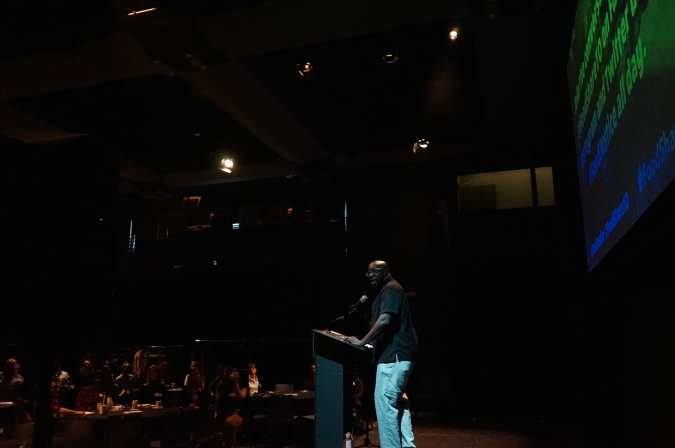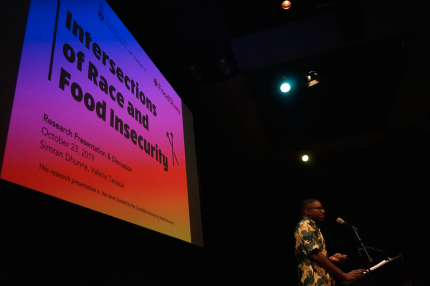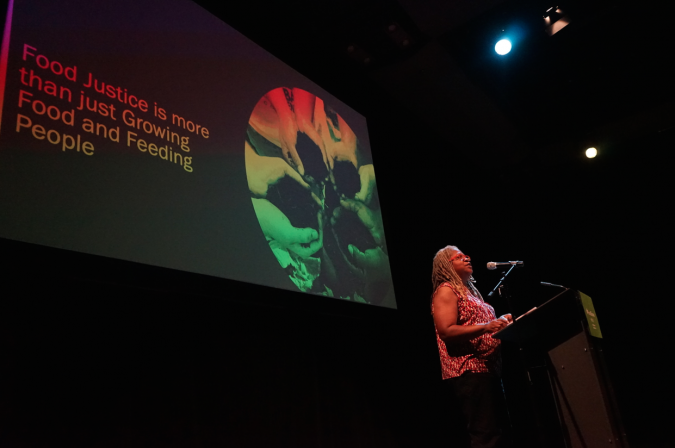Advancing Food Justice and Equity: a Bring Food Home Regional Conference Summary
Posted: November 19, 2019
Categories: Events / GoodFoodBites / News from Sustain Members / News from Sustain Ontario
All content below has been provided by FoodShare, including the images — check out the original blog post here. And check out the great Impact Report FoodShare has put together on this event.
– – – – –
We recently hosted Advancing Food Justice and Equity, a full-day gathering focused on taking action around issues of race and oppression in the food system and food movement. Below are some of the highlight’s from the day. Thank you to our sponsors The Sprott Foundation, Feed Opportunity, Sustain Ontario, Whole Foods Market, Artscape and UFCW Canada for helping make the day happen.

“Food justice means dismantling the forces that maintain oppression,” said Paul M. Taylor in his opening remarks. With 4 million Canadians experiencing food insecurity, the time for food justice is now.
Leslie Campbell presented “Intersections of Race and Food Insecurity.” This research collaboration between FoodShare Toronto and PROOF looked at how food insecurity disproportionately affects Black households in Canada.
 “Chronic hunger, over time, kills people,” says Leslie Campbell. While food security organizations work with racialized folks, we didn’t have race based data until now. Leslie shared the facts around food insecurity: 10% of white households are food insecure while 28.4% of Black households are food insecure. Black households are 3.56 times more likely to be food insecure than white households. The overriding factor determining vulnerability to household food insecurity is whether one is racialized as Black. Click here to read our factsheet.
“Chronic hunger, over time, kills people,” says Leslie Campbell. While food security organizations work with racialized folks, we didn’t have race based data until now. Leslie shared the facts around food insecurity: 10% of white households are food insecure while 28.4% of Black households are food insecure. Black households are 3.56 times more likely to be food insecure than white households. The overriding factor determining vulnerability to household food insecurity is whether one is racialized as Black. Click here to read our factsheet.
Next we heard from Keynote Speaker, Karen Washington. Karen spoke about the need to challenge racism in the food movement, why food justice is important and why “food deserts” should really be called “food apartheid.”
“Putting my hands in the soil changed my life,” said Karen Washington, recognizing the lessons learned through her interactions with urban agriculture. “Why do we have hunger and poverty? Because the history of our food system is oppression.”
Don’t ask us what we need. Ask us what we want! Want comes from a place of strength communities already have. If you’re not actively working to dismantle racism and oppression then you’re not doing food justice! You’re window dressing!

Sheliza Jamal delivered a workshop on examining unconscious bias. Conference attendees looked at how personal and structural biases impact belief systems and in turn organizational policies related to food insecurity and racism. Folks learned about identifying bias and developed tangible strategies to disrupt it.
Our Food Justice and Equity in Practice panel conversation included folks like Leticia Deawuo (Black Creek Community Farm), Donald Corbiere (Toronto Public Health) and Cheyenne Sundance (Sundance Harvest). The panelists focused on individuals working within their own organizations to challenge racism and oppression. They shared their experiences and discussed useful tools for embedding equity and food justice principles in their organization’s structure and operations.
Thank you to all who joined us at Advancing Food Justice and Equity! Let’s continue acknowledging uncomfortable realities, holding decision makers accountable and seeking income-based solutions to poverty.
One response to “Advancing Food Justice and Equity: a Bring Food Home Regional Conference Summary”
Leave a Reply
You must be logged in to post a comment.

[…] powerful recordings from FoodShare’s Advancing Food Justice & Equity event are now available on the Greenhouse, under the ‘Food Justice’ initiative: Karen […]